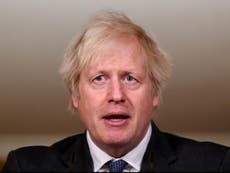AstraZeneca boss speaks out as Boris Johnson appeals to EU not to restrict vaccine movements in supply row
Company chief confirms UK will have first claim on jabs, as it got order in three months earlier than Brussels
Your support helps us to tell the story
From reproductive rights to climate change to Big Tech, The Independent is on the ground when the story is developing. Whether it's investigating the financials of Elon Musk's pro-Trump PAC or producing our latest documentary, 'The A Word', which shines a light on the American women fighting for reproductive rights, we know how important it is to parse out the facts from the messaging.
At such a critical moment in US history, we need reporters on the ground. Your donation allows us to keep sending journalists to speak to both sides of the story.
The Independent is trusted by Americans across the entire political spectrum. And unlike many other quality news outlets, we choose not to lock Americans out of our reporting and analysis with paywalls. We believe quality journalism should be available to everyone, paid for by those who can afford it.
Your support makes all the difference.Boris Johnson has appealed for the world to avoid restrictions to vaccine movements across borders, as an escalating row between the EU and drugs giant AstraZeneca threatens supplies of the coronavirus jab.
The plea came as AZ’s chief executive Pascal Soriot confirmed that the UK would have first claim on vaccines produced by the company in Britain, and said that glitches in EU supply were the result of Brussels taking three months longer than London to seal a deal.
Speaking to Italian newspaper La Repubblica, Mr Soriot said the UK’s “one-dose strategy” of delaying booster jabs for 12 weeks after the initial injection was “absolutely the right way to go” with the AZ product, and would allow Britain to vaccinate 28 to 30 million people by March.
Brussels has threatened to impose export controls on vaccines produced within the 27-nation bloc after the Anglo-Swedish multinational – which was due to deliver 80 million doses to the EU by the end of March – suddenly said it was cutting supplies by as much as 60 per cent.
The UK’s vaccine minister Nadhim Zahawi insisted that there was no risk to deliveries of tens of millions of doses of the separate Pfizer product ordered by Britain, which is produced in Belgium.
But European Commission president Ursula von der Leyen insisted that Brussels “means business”, after investing €2.7bn in vaccine research and production to speed the delivery of protection against Covid-19.
"Europe invested billions to help develop the world's first Covid-19 vaccines," Ms von der Leyen told the World Economic Forum's virtual event in Switzerland. "And now the companies must deliver. They must honour their obligations."
German chancellor Angela Merkel told the same event that there should be a "fair distribution" across the world, while her health minister Jens Spahn said: "This is not about EU first, it's about Europe's fair share."
The EU signed a deal in August for 300 million doses of the AZ drug, developed with Oxford University, with an option for 100m more. With approval expected from the European Medicines Agency on Friday, it was expected that delivery would start straight away, with some 80m doses arriving in the 27 nations by March.
But last week, AZ said "reduced yields at a manufacturing site within our European supply chain" meant the number of initial doses for EU member states would be reduced to as little as 31m doses.
In a phone call to Mr Soriot on Monday, Ms von der Leyen insisted that the company must “deliver on the contractual arrangement”.
And European health commissioner Stella Kyriakides warned that the EU “will take any action required to protect its citizens and rights”, as she announced an “export transparency mechanism” requiring companies to provide early notification for exports of vaccines to third countries.
In a mark of growing mistrust, Commission spokesman Eric Mamer said: “We see that doses are being delivered elsewhere and we know that we have signed an agreement.”
But Mr Soriot said that the agreement signed with the EU did not offer a contractual commitment to deliver vaccines at certain volumes, just a promise to “make our best effort” to do so.
He said delays were due to low yields of vaccine from a batch at an AZ plant in Belgium, which is an issue to be expected when scaling production up to billions of doses within months.
“We’ve also had teething issues like this in the UK supply chain,” Mr Soriot told La Repubblica. “But the UK contract was signed three months before the European vaccine deal, so with the UK we have had an extra three months to fix all the glitches we experienced.”
The European Commission has not denied claims that officials asked for doses to be redirected from the UK to make up for the shortfall from the Belgium.
But Mr Soriot said: “As you could imagine, the UK government said the supply coming out of the UK supply chain would go for the UK first. Basically, that’s how it is.”
Mr Soriot said that European governments were getting “aggravated or emotional” about supply issues, but insisted that AZ was not diverting vaccine away from the EU to sell elsewhere.
The company was making “zero profit” on the vaccine, which was sold at three or four dollars a dose everywhere in the world, with small variations depending on supply chains, he said.
EU governments are coming under increasing pressure over the slow rollout of vaccines, with just 2 per cent of the bloc’s population protected so far, compared to more than 10 per cent in the UK. Delays in getting batches of doses will make it harder to meet early targets in the EU's goal of vaccinating 70 per cent of its adults by late summer.
Mr Johnson appealed for them not to retaliate by erecting barriers against vaccines reaching the UK.
Insisting he had “total confidence” in the UK’s supply, the prime minister told a Downing Street press conference: “We expect and hope that our EU friends will honour all contracts.”
Mr Johnson said coronavirus vaccines were “a wonderful example of multi-national co-operation” and that one of the lessons the world should learn from the pandemic was “the need to co-operate”.
He added: “I don’t want to see restrictions on the supply of PPE across borders, I don’t want to see restrictions on the supply of drugs across borders, and I don’t want to see restrictions on vaccines or their ingredients across borders”.
Britain has ordered 367 million doses of vaccine from seven different suppliers, with three so far cleared for use by safety regulators.
Pfizer has already warned of potential disruption to supplies to the UK, and health secretary Matt Hancock admitted supplies were “tight”.
NHS England chief Sir Simon Stevens told MPs: “Of course there’s a supply shortage, and we’ve done very well in this country to get the supply we have available to us, the question is how do we use it to best effect.”
Mr Hancock said he had spoken to chief executives at Pfizer and AZ, telling an event hosted by the Chatham House thinktank: “I’m sure that we can work with the EU to ensure that... no blockers are put in place.”
He added: “I would urge all international partners to be collaborative and work closely together. Protectionism is not the right approach in the middle of a pandemic.”
Number 10 said it was not expecting vaccine supply levels to change, with the prime minister’s official spokesperson saying: “AstraZeneca are committed to delivering two million doses a week to the UK and we are not expecting any changes to that.
EMA executive director Emer Cooke acknowledged concerns across the continent and said the agency was working closely with COVID-19 vaccine makers to consider different manufacturing options to boost production, such as opening new plants.
The EU has signed six vaccine contracts for more than 2 billion doses, but only the Pfizer-BioNTech and Moderna vaccines have been approved for use so far.
The executive director of Chatham House’s Centre for Universal Health, Robert Yates, warned that countries hoarding vaccines could make the pandemic more dangerous, as it could give the virus greater opportunity to mutate in countries without immunisation.
Mr Yates said the priority should be to vaccinate the whole world “equitably and fairly” this year, with health workers and vulnerable people in developing countries coming ahead of young people in countries like the UK who are less susceptible.
“Unfortunately, this isn't happening,” he told Times Radio. “We are already seeing competition across nations.
“I think the Conservative Party put out a tweet just a couple of weeks ago crowing that the UK has vaccinated more people than Italy, France, Germany and Spain combined. I think we get the politics of this, but this really is not fostering this idea of collaboration. And one worries that measures like this are seen as retaliation."




Join our commenting forum
Join thought-provoking conversations, follow other Independent readers and see their replies
Comments